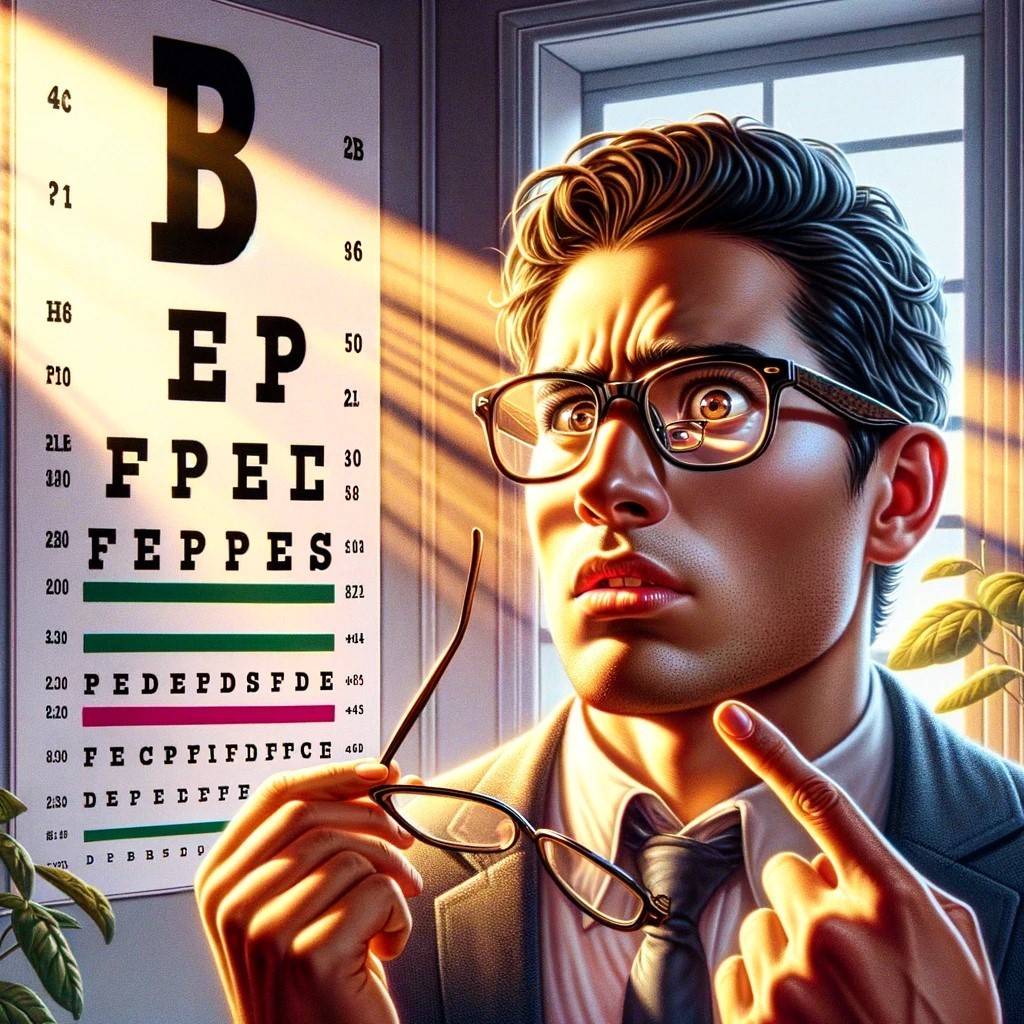Does Wearing Glasses Improve Eyesight? Expert Insights.
Get expert insights: Does wearing glasses improve eyesight? Discover the truth about vision enhancement with eyeglasses. Find out more.
Introduction to Does Wearing Glasses Improve Eyesight
Welcome to our deep dive into a question that affects millions around the globe: Does wearing glasses improve eyesight? For anyone who has ever squinted at a menu or held a book at arm’s length, the solution often comes in the form of prescription lenses. But how do these carefully crafted pieces of glass or plastic affect our vision? Let’s explore what the experts have to say.
Understanding Eyesight and the Role of Corrective Lenses

Does Wearing Glasses Improve Eyesight?
Eyesight is our window to the world, but not all windows are clear. To understand the role glasses, play, we must first delve into the mechanics of the eye. Eyesight is measured through a complex interplay of corneal curvature, lens flexibility, and retinal health. When light enters our eyes, it’s bent and focused on the retina — the eye’s sensitive inner layer.
Common Vision Problems:

- Myopia (Nearsightedness): When the eye is too long, causing distant objects to blur.
- Hyperopia (Farsightedness): When the eye is too short, making nearby objects less clear.
- Astigmatism: When the cornea’s curvature is uneven, leading to distorted vision.
- Presbyopia: An age-related condition where the eye’s lens stiffens, affecting the ability to focus up close.
Corrective lenses are designed to bend light rays that complement the eye’s deficiencies, sharpening our vision. But this begs the question: Can glasses improve eyesight permanently? No, they cannot. They are an aid, not a cure, adjusting the focus while they are worn but not altering the eye’s anatomy.
The Short and Long-term Effects of Wearing Glasses
Does Wearing Glasses Improve Eyesight?
When it comes to the impact of glasses on eyesight, the distinction between short-term correction and long-term effects is pivotal. It’s a common misconception that eyeglasses alter the eyes themselves; in reality, they modify the light entering the eye to achieve clear vision.
Short-term Effects:
- Immediate Improvement: Upon donning glasses, many people experience an instant enhancement in clarity.
- Reduction of Eyestrain: Correctly prescribed lenses can alleviate the strain on the eyes from squinting or overexertion.
Long-term Effects:
- No Permanent Change: Long-term use of glasses does not improve or deteriorate eyesight. They provide a constant corrective measure, not a progressive one.
- Dependency Myths: The idea that eyes grow ‘lazy’ or are more dependent on glasses is largely a myth. Your eyes may become accustomed to the clarity, but not weaker.
Eyeglasses are a corrective tool, much like a cast for a broken bone; they support the healing or functioning process but do not heal the bone itself. Similarly, glasses support vision but do not improve the eye’s physical condition.
Debunking Myths: The Truth About Glasses and Vision Improvement
It’s crucial to dispel some myths about glasses and vision. Does Wearing Glasses Improve Eyesight? The answer is nuanced.
- Myth: Glasses weaken eyes. Fact: Glasses do not change the physical structure of the eye; they merely compensate for its refractive errors.
- Myth: Not wearing glasses will strengthen the eyes. Fact: Straining to see without corrective lenses can lead to headaches and fatigue but does not strengthen vision.
- Myth: Glasses can permanently correct vision. Fact: While glasses help you see clearly while wearing them, they do not lead to lasting improvements in eyesight.
Understanding these truths is essential in appreciating how glasses work and setting realistic expectations for those who wear them.
Expert Insights on Glasses and Eye Health

Experts in optometry and ophthalmology can provide valuable insights into whether wearing Glasses improves eyesight
- Preventive Measures: Wearing glasses with the correct prescription can prevent the progression of certain conditions, like eyestrain and its associated symptoms.
- Tailored Solutions: An optometrist can tailor glasses to individual needs, which is crucial for optimal eye health.
- Holistic Approach: Experts often suggest a combination of wearing glasses and engaging in eye exercises or other vision therapies for comprehensive eye care.
We can continue to explore the impact of glasses on children and teens, the psychological effects of wearing glasses, and how technology is changing the way we approach vision correction.
The Impact of Glasses on Children and Teens
The developing eyes of children and teens are a subject of particular interest when considering the role of glasses in eyesight. Pediatric optometry provides us with insights that are both compelling and instructive.
Vision Development:
- Critical Periods: There are windows of time during childhood when vision develops most rapidly, and correct vision aids are crucial during these phases.
- Monitoring Changes: Regular eye exams are vital as children grow, given that their eyesight can change frequently.
Social and Educational Repercussions:
- Confidence and Participation: Glasses can significantly impact a young person’s self-image and participation in activities, both academic and extracurricular.
- Screen Time: With the increasing use of digital screens, glasses that filter blue light have become popular to reduce eyestrain.
Long-term Habits:
- Eye Health Education: Teaching children about eye health can instill lifelong habits for maintaining good vision.
- Early Intervention: Addressing vision problems early with glasses can prevent more serious issues in the future.
Psychological Effects of Wearing Glasses
The psychological impact of wearing glasses is an area ripe with misconceptions and stereotypes but also with positive revelations.
Self-Perception:
- Identity and Self-Esteem: For some, glasses become a part of their identity, influencing self-esteem and confidence.
- Fashion Statement: Glasses have transcended their medical purpose for many, becoming a fashion accessory that can boost confidence.
Public Perception:
- Breaking Stereotypes: The stereotype of the ‘four-eyed geek’ is increasingly outdated as glasses become more stylish and mainstream.
- Social Interaction: How one is perceived when wearing glasses can affect social interactions, although this is changing with cultural shifts.
Technology and Vision Correction: Beyond Traditional Glasses
The field of vision correction is developing rapidly, with technology playing a significant role in shaping future trends.
Innovations in Eyewear:
- Smart Glasses: The development of smart glasses adds layers of functionality, merging vision correction with technology.
- Customization: Advances in manufacturing allow for highly customized frames and lenses tailored to individual lifestyles and preferences.
Alternative Treatments:
- Surgical Options: Procedures like LASIK offer alternatives to glasses, although they aren’t suitable for everyone.
- Contact Lenses: Technological advancements in contact lenses offer more comfort and options for users, including those who cannot wear traditional glasses.
The Role of Glasses in Children’s Vision Development
Understanding the Critical Periods of Vision Maturation
Vision development in children undergoes several critical periods. During these phases, the eyesight is highly malleable and responsive to correction. Glasses prescribed in these stages can correct refractive errors, improving visual acuity and preventing the development of amblyopia or “lazy eye.” It’s essential to identify and correct vision issues during these periods, as the opportunity for correction diminishes as the child ages.
Keeping Up with the Pace of Change
Children’s eyes change rapidly, necessitating regular eye examinations. Glasses may need frequent updating to match the pace at which a child’s eyesight develops. Ignoring these changes can lead to inadequate vision correction, which may negatively impact the child’s learning and social interactions.
Laying the Foundation for Lifelong Eye Health
Early interventions with glasses can set the precedent for maintaining eye health throughout life. Educating children about the importance of eye care encourages proactive attitudes towards eye health. Additionally, this early intervention can reduce the risk of more severe vision problems in the future.
Psychosocial Aspects of Glasses Among Youth
Self-Image and the Glasses Effect
Glasses often become a part of a young individual’s self-identity. They can either boost self-esteem or contribute to self-consciousness, depending on various factors, including the style of the glasses and the attitudes of peers. The right pair of glasses can increase a child’s confidence, aiding in social and academic performance.
Tackling Stereotypes and Embracing Style
Glasses have historically come with stigmas, but the modern era sees them as a fashion statement. Breaking away from the ‘nerdy’ stereotype, glasses are now designed to be stylish accessories. This shift has a positive impact on the wearer’s psychological well-being and social life.
Technological Advancements in Corrective Eyewear
Smart Glasses
Does Wearing Glasses Improve Eyesight?
Smart glasses incorporate cutting-edge technology to enhance vision while offering additional functionalities, such as augmented reality. These high-tech devices are not only vision-corrective but also serve as gateways to digital information, merging the digital and physical worlds.
The Surge of Customization and Alternatives to Traditional Glasses
Customized frames and lenses are becoming increasingly popular, made possible by technological advancements. Beyond traditional glasses, alternatives like contact lenses and corrective surgeries such as LASIK provide additional options for vision correction, though they come with their own sets of criteria and potential risks.
Understanding Prescription Glasses and Vision Correction
Prescription glasses are more than mere accessories; they’re a fusion of science and engineering, tailored to correct specific refractive errors that blur vision. They achieve this by adjusting the way light bends into the eyes, ensuring it hits the retina just right. Let’s delve into how they address common vision problems:
- Myopia or Nearsightedness: Glasses with concave lenses help focus distant objects on the retina, sharpening what appears far away.
- Hyperopia or Farsightedness: Convex lenses are used to aid in focusing on closer objects, making reading and other near tasks clearer.
- Astigmatism: This is corrected by lenses that are specially shaped to compensate for the uneven curvature of the cornea or lens inside the eye.
- Presbyopia: This age-related condition is usually managed with bifocal or multifocal lenses that allow for seeing at multiple distances.
Does Wearing Glasses Improve Eyesight?
While glasses correct vision, they do not ‘cure’ the eye of its refractive error. The lens in our glasses compensates for the imperfections in the eye’s lens. It’s a bit like hearing aids for the ears; they help when in use but don’t improve the ear’s natural function.
How Often Should You Update Your Prescription?
Eyesight can change over time due to age, health, and lifestyle factors. Regular eye exams are crucial to ensure your prescription stays up-to-date. The frequency can vary, but a general rule of thumb is to have your eyes checked:
- Every 1-2 years for adults under 40
- Annually for those between 40 and 65
- Every 6-12 months for seniors over 65
Now, let’s explore some myths and facts about wearing glasses and eyesight.
Dispelling Myths: Does Wearing Glasses Weaken Your Eyes?
Many people worry that wearing glasses too often can weaken their eyes. This is a common myth. In reality, glasses are designed to aid vision and do not affect the physical strength or health of the eyes. On the contrary, straining to see without corrective lenses can lead to headaches and eye fatigue.
Fact-Check on Glasses and Eyesight:
- Glasses cause dependence: You become accustomed to clear vision, but they do not make your eyes worse.
- Not wearing glasses can strengthen the eyes: This can lead to eyestrain and discomfort.
- Children wearing glasses will always need them, which is not necessarily true. Some children outgrow certain eye conditions as they mature.
The Role of Eye Exercises
There’s a buzz around eye exercises and their potential to improve vision naturally. While exercises can enhance visual skills and alleviate eye strain, they cannot correct refractive errors. However, they’re excellent for maintaining eye health and should be a part of everyone’s routine.
Eye Exercises to Try:
- Focus Shifting: Alternating focus between a close object and a distant one to improve flexibility.
- Pencil Push-ups: Focusing on a pencil as it moves closer to the nose is beneficial for convergence insufficiency.
- Eye Movements: Moving the eyes in different directions to strengthen the eye muscles.
It’s time to look at the nutritional and lifestyle choices that can complement your vision health.
Nutrition and Lifestyle: Boosting Eye Health
Your lifestyle choices can significantly impact your eye health. A balanced diet rich in vitamins A, C, and E, along with minerals like zinc and omega-3 fatty acids, can help maintain eye function.
Key Foods for Eye Health:
- Leafy Greens: Spinach and kale are packed with lutein and zeaxanthin, which are important for retinal health.
- Fish: Salmon and mackerel provide omega-3 fatty acids that can help prevent macular degeneration.
- Eggs: The yolk contains nutrients that can reduce the risk of cataracts.
Regular exercise and avoiding smoking can also contribute to better eye health, delaying the onset of eye diseases like cataracts and glaucoma.
Final Thoughts about Does Wearing Glasses Improve Eyesight
To wrap up, wearing glasses is a highly effective way to manage poor eyesight. They are not a permanent fix but a means to enjoy the world in high definition. Remember, regular eye check-ups, a healthy lifestyle, and protective measures are your best bet for maintaining eye health.
Take care of your eyes; they are the only pair you’ve got!



